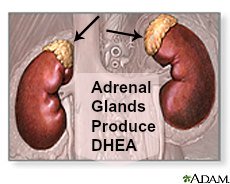Side Effects of DHEA
Is it Safe or Not…
There are very few Side Effects of DHEA, but there is also little information about its long term safety either, so while it does seem to have some benefits, it's good to be cautious about long term usage.

DHEA, technically known as Dehydroepiandrosterone, is a widely available non-prescription supplement that is naturally produced by the body from the adrenal glands. Since it is produced by a gland in the body, it is considered a hormone and has some properties that increase resistance to stress and inflammation and has several studies reporting improved mood. It has also been touted as an 'anti-aging' supplement since DHEA hormone levels decrease as one ages and low levels of DHEA correlate with some of the common problems of aging.
Side Effects of DHEA
As I said earlier, there is little data on DHEA for long term usage, but in short-term usage of up to a year there are very few reported Side Effects of DHEA. There have been dozens of studies done on this hormone with, fortunately, very few side effects reported in either men or women. The side effects that have been reported are almost always mild and reverse when the DHEA supplements are stopped.
Studies on DHEA Supplements have used from 25 mg up to 500 mg per day and the minor problems associated with this hormone do not seem to be dependent upon dosage. In other words, no worse side effects were noted at higher doses than at lower doses, so the dosage doesn't seem to matter in terms of DHEA side effects.
Skin
Skin issues were probably the most common side effects and
included mainly acne, more sweating, more odorous sweat and scalp
itching. Again, these side effects were mild and went away after the
supplements were stopped.
Cholesterol Profile
While many studies showed that there were no significant changes in cholesterol profiles with the use of DHEA, a few studies showed a small DECREASE in 'good' HDL cholesterol levels in postmenopausal women. Since you want HIGH HDL cholesterol levels, this decrease in HDL is not favorable. HOWEVER, some studies showed a decrease in triglyceride levels as well. Decreasing triglycerides is a good thing and this decrease in triglycerides may possibly offset the decrease in good cholesterol and cancelling each other out.
In any case, no one has studied the long term usage of DHEA and therefore, there is no way to know if these changes in cholesterol levels are in any way significant or would have any lasting effects on heart health.
That's It
Really, that's it for the Side Effects of DHEA. In all
of the studies done on DHEA showed no serious adverse events and nothing
more serious than what is outlined here. DHEA certainly seems like a
very interesting dietary supplement that has been shown to have
potential benefits for mood, viral infections and some of the problems
of aging. If you think that you might benefit from DHEA Supplements, getting an Adrenal Function Test that includes DHEA levels is an excellent idea before you begin taking this hormone.
Research
3) Oral dehydroepiandrosterone (DHEA) replacement therapy in women with Addison's disease
4) Effects of dehydroepiandrosterone vs androstenedione supplementation in men
5) Effects on Lipoprotein Particles of Long-Term Dehydroepiandrosterone in Elderly Men and Women
6) Effects of Replacement Dose of DHEA in Men and Women of Advancing Age
8) Effects of Replacement Dose of DHEA in Men and Women of Advancing Age
Back to Top of Side Effects of DHEA
To Side Effects Site Home





